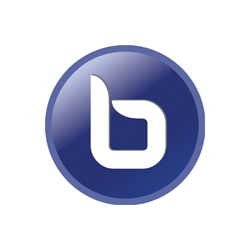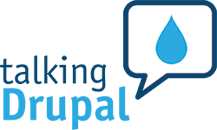Agaric Backs Community Coworking Center in NYC
Thinking it would be a great place to work a day or two while in New York City for clients or DrupalCamps, Agaric dropped a few dollars in the Kickstarter fund for New Work City: Community Coworking Center for Independents in NY.
Agaric Sponsors Modulecraft for the Building of Drupal Shared business, Development, and Training Tools
For community shared business, development, and training tools, Agaric throws a little sponsorship at modulecraft.
Agaric Provides Very Minor Assist in Readying Insert Module for Drupal 7
Benjamin Melançon of Agaric helped with a patch for the Drupal 7 version of Insert module.
Agaric?
What the word agaric means and why Agaric took it for our cooperative's name.
Designed to Life
Functionality designed to your life is the Agaric Design signature. Utilizing open source, free software from around the world, Agaric Design websites are impeccably crafted with a modern, sophisticated and understated spirit.
The Story on Agaric
I've always had a passion for good design and healthy coding, even back in the days of owning a web site cart in downtown Natick. Back then, my business partner and I made all natural HTML roll-up web sites and, as an incentive for customers to wait in line, we baked Drupal into different flavored designs.
The growing community built around Drupal offers a multitude of options to easily integrate Drupal into your current lifestyle and to branch out in new and different ways. Here are a few ways to migrate your lifestyle to one as a Freelance Drupal Developer and a contributor to the community.
If you have a 9 to 5 job at an office or a specific location, you can choose to view online Drupal tutorials in whatever spare time you have instead of watching a movie. Drupal tutorials can be quite entertaining at times and are especially rewarding because they will change your life for the better.
Sign up for an account on Drupal.org and download the latest version of Drupal. Install Drupal locally on your hard drive and use some of the knowledge you learned in the tutorials. If you get stuck, log onto groups.drupal.org and search for an answer to your issue - chances are good that someone else has had the same issue and the solution will be posted there. As you search through the posts on the forum, be sure to respond to any posts that you may have the solution for. Since you have just gone through the install and setup, there is a good possibility that even as a beginner - you too may be able to help someone else. It's a good practice to do both things on a forum visit:
- Ask For Help
- Give Some Help
After a few weeks or months viewing tutorial videos and getting a solid idea of the moving parts within Drupal, you can start to create your first real site. I recommend that you involve a friend. Most people have at least one friend that has an idea for a business venture. Ask your friend if you may help them build a site based on their business idea. Enlist the friend to help you by inviting them over for a bowl of popcorn and a few Drupal movies...
Sign up to be notified when Agaric gives a migration training:
With Drupal 7's third and final release candidate unleashed on us all this morning, it is long past time to help the #D7CX movement with a seasonal offering of our own.
The most fitting gift would be porting a Drupal 6 module, but it wouldn't be a modern winter holiday without an environmentally irresponsible brand new toy: Introducing the Xray module, designed to help site builders and module developers investigate a Drupal 7 site.
 The feature i'd like to point out in relation to porting modules and developing for Drupal 7 is Xray's report showing permission machine names (screenshot below). Permissions in Drupal 7 have human-friendly translatable titles, which is awesome, but the machine names – which module developers must use – have disappeared entirely from the user interface.
The feature i'd like to point out in relation to porting modules and developing for Drupal 7 is Xray's report showing permission machine names (screenshot below). Permissions in Drupal 7 have human-friendly translatable titles, which is awesome, but the machine names – which module developers must use – have disappeared entirely from the user interface.
A moderately complex Drupal site can have a Permissions page like a Las Vegas building-side of lightbulbs... but with checkboxes – so i don't like to create new permissions unless i know of a clear use case. In developing modules, therefore, i prefer to reuse existing permissions when applicable. For instance, the Xray module, instead of defining a special permission for its reports, reuses the "View site reports" permission.
To refer to a permission in code, we need its machine name, not the title we can see on the Permissions page (admin/people/permissions). My chapter on module development in the coming Definitive Guide to Drupal 7 covers (in the course of building the Xray module) how to find permission machine names in the database or in the code, but it wouldn't be Drupal if we couldn't say there's a module for that, so a permission machine name report is incorporated into Xray itself.
Note: Anything incorrect in this chapter may misinform tens of thousands, so please, code review Xray module mercilessly, and all comments and suggestions requested and welcome!
Further note: Please vote for the When There's Not a Module for That, the intermediate module building session at Drupalcon Chicago which will include parts of the making of Xray module, and for sessions involving other DGD7 authors, and then for every session that interests you because there's less than 24 hours left to vote!
By the way, the machine name for "View site reports" is access site reports. Drupal will always keep us on our toes.
Xray, in another feature interesting for module developers and sometimes for site builders, displays what function and arguments produce each page you visit.
The most up-to-date code for Xray can be downloaded directly (tar.gz) from Gitorious.
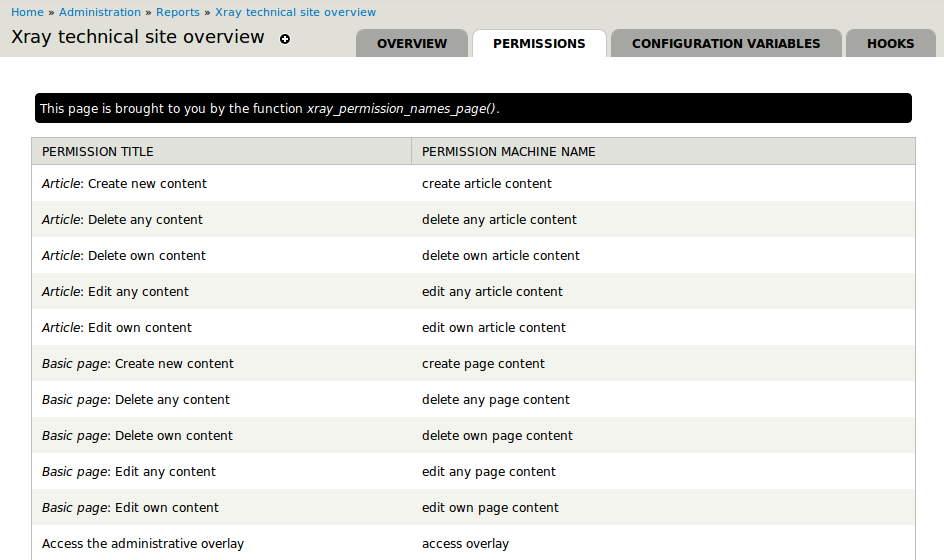
America was founded on freedom and liberty. Eventually we found out that did not mean freedom for me, and probably not for you either. We have also discovered that when corporations sell proprietary software it prevents your access to features and compromises your privacy. So, continuing to build the future on a proprietary foundation, without total access to the inner workings {source code}... we can be held hostage at anytime to a myriad of conditions that we have no control over.
Building on proprietary solutions also means you will be excluding many of the people that need to benefit from it the most, whether intentionally or not. The people that need freedom are mostly hindered by obstacles that we can remove. Most are hindered by the lack of education about computer use and lack of money to buy the newest devices that are necessary to experience the internet. Out of 7.125 billion, 1.9 billion people have smartphones. This consumer revolution is prompting families existing on low wages to make hard choices about their lifestyles and great sacrifices to purchase an internet device such as a smartphone. How will they pay for the connectivity? Should we all be working on a free solution to this global issue?
The values identified by the Free Software Movement exemplify the values needed in a society that offers justice to all, society needs to offer access to justice for all too.
A program is free software if the program's users have the four essential freedoms:
- Freedom 0: The freedom to run the program as you wish, for any purpose.
- Freedom 1: The freedom to study how the program works, and change it so it does your computing as you wish. Access to the source code is a precondition for this.
- Freedom 2: The freedom to redistribute copies so you can help your neighbor.
- Freedom 3: The freedom to distribute copies of your modified versions to others. By doing this you can give the whole community a chance to benefit from your changes. Access to the source code is a precondition for this.
You can relate this to a person by changing a few of the words:
A person is free if they have the four essential freedoms:
- Freedom 0: The freedom to live as you wish, for any purpose.
- Freedom 1: The freedom to study what and how you wish. Access to education is a precondition for this.
- Freedom 2: The freedom to redistribute studies or ideas so you can help your neighbor.
- Freedom 3: The freedom to distribute copies of modified studies or ideas to others. By doing this you can give your whole community a chance to benefit from your experiences. Access to the education to formulate and understand ideas is a precondition for this.
So, how does this affect my daily life? After several years in the Drupal community, the free scholar in me got really tired of hearing developers that are excited about some proprietary solutions that happen to work with Drupal. Some of these solutions are being touted as the way to go in the future. I believe that our community has no shortage of genius, creative minds, and brilliant ideas. I encourage us all to think deeply about the tools we use and how they impact our personal liberties and how we can create comfortable jobs for ourselves.
For those of us that are developers, learning to explain the philosophy of free software as opposed to open source is key to autonomy, privacy, and human rights. Framing the conversation is key to the message getting to the people that need to hear it. When people are choosing convenience over privacy, it is hard to frame an argument for free software that asks us to be involved by contributing our ideas. To me, it seemed necessary to involve the people with the best future vision, that have already expounded on these theoretical scenarios around privacy concerns that have become a reality.
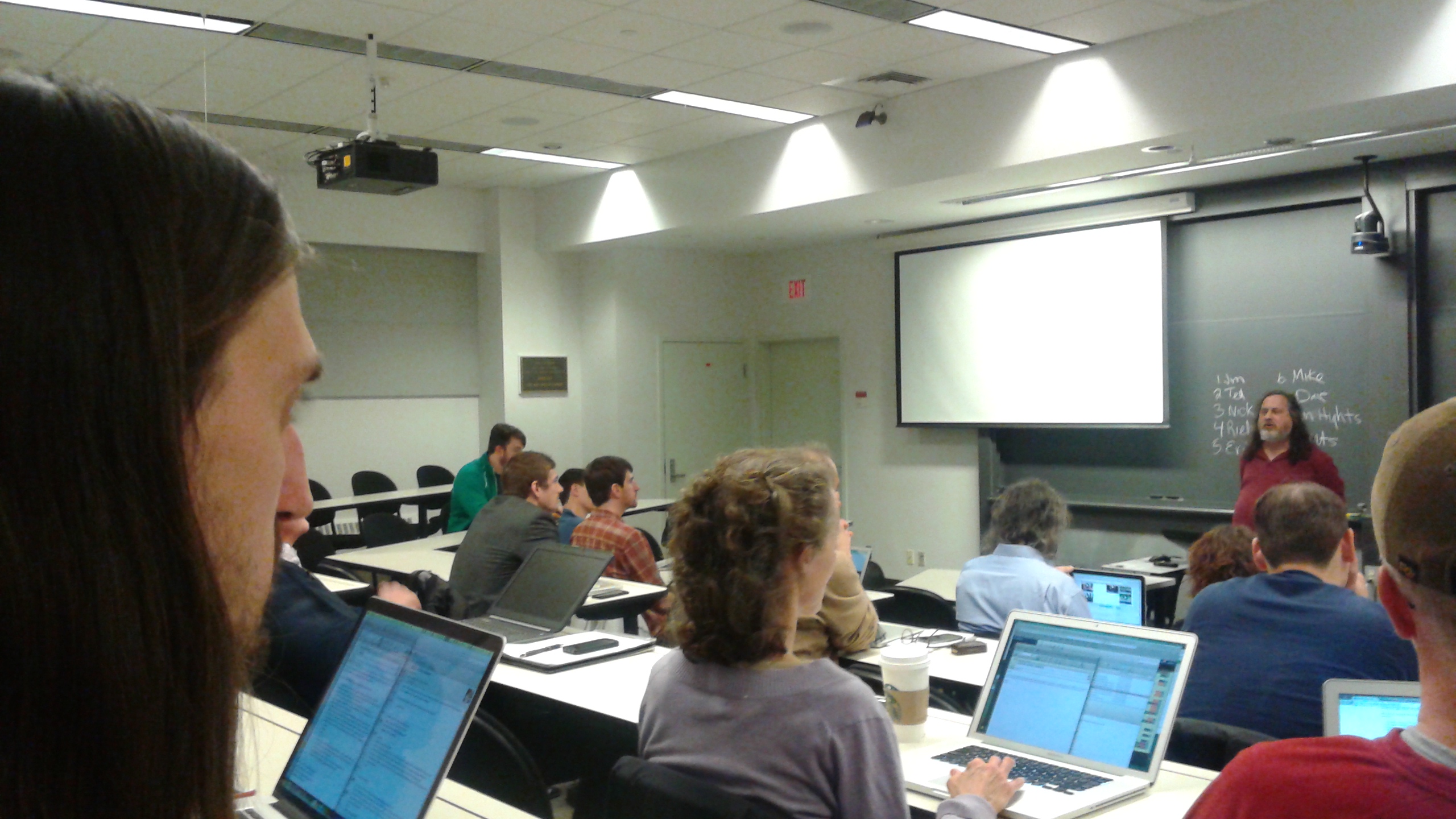
In May of 2015, I invited Richard M. Stallman (RMS) to the monthly Drupal meetup at MIT. I wanted him to meet some of the developers from the Boston Drupal community and experience how we work together on sharing knowledge and working on projects that are dear to our hearts, helpful to our communities, and good for society and cooperation. He gave a short lightning talk about free software and hardware followed by a Q and A. Many of us got a better understanding of what the free software movement is and how we can be a part of the educational outreach for the Free Software Foundation (FSF) to raise awareness and adoption. You can find most of the educational materials you will need on the FSF.org website.
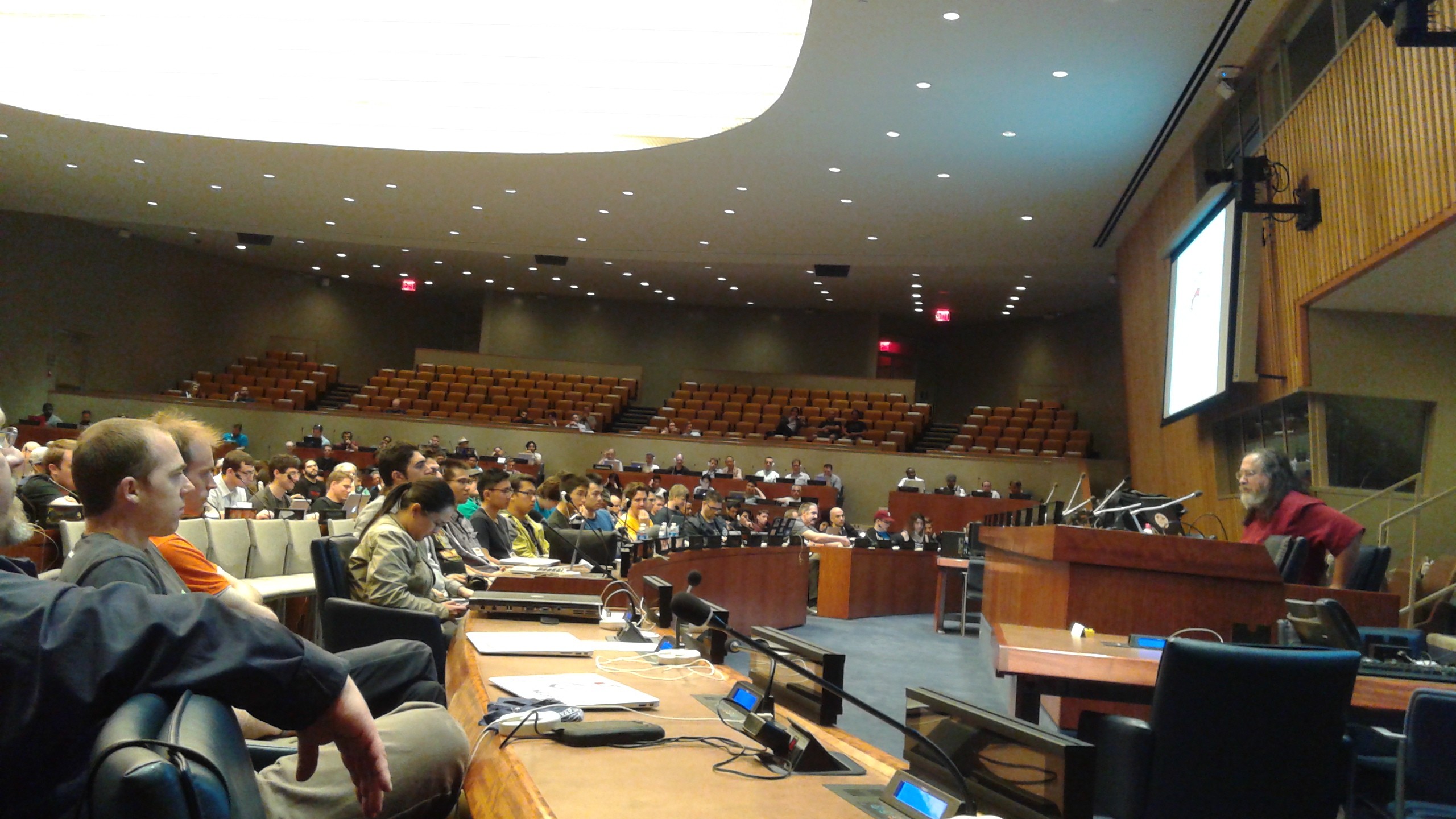
Next, I invited RMS to NYCcamp. On Saturday July 18th, he gave the keynote speech to a large group, mostly web developers, at the United Nations. Later, he connected with the Aegir team to discuss web hosting platforms and free server tools, which led to a larger group convening at the Aegir Strategy Session with the Aegir team lead, Chris Gervais and RMS. They led an engaging round table discussion with about 30 people actively talking about the future of free tools for hosting and managing websites.
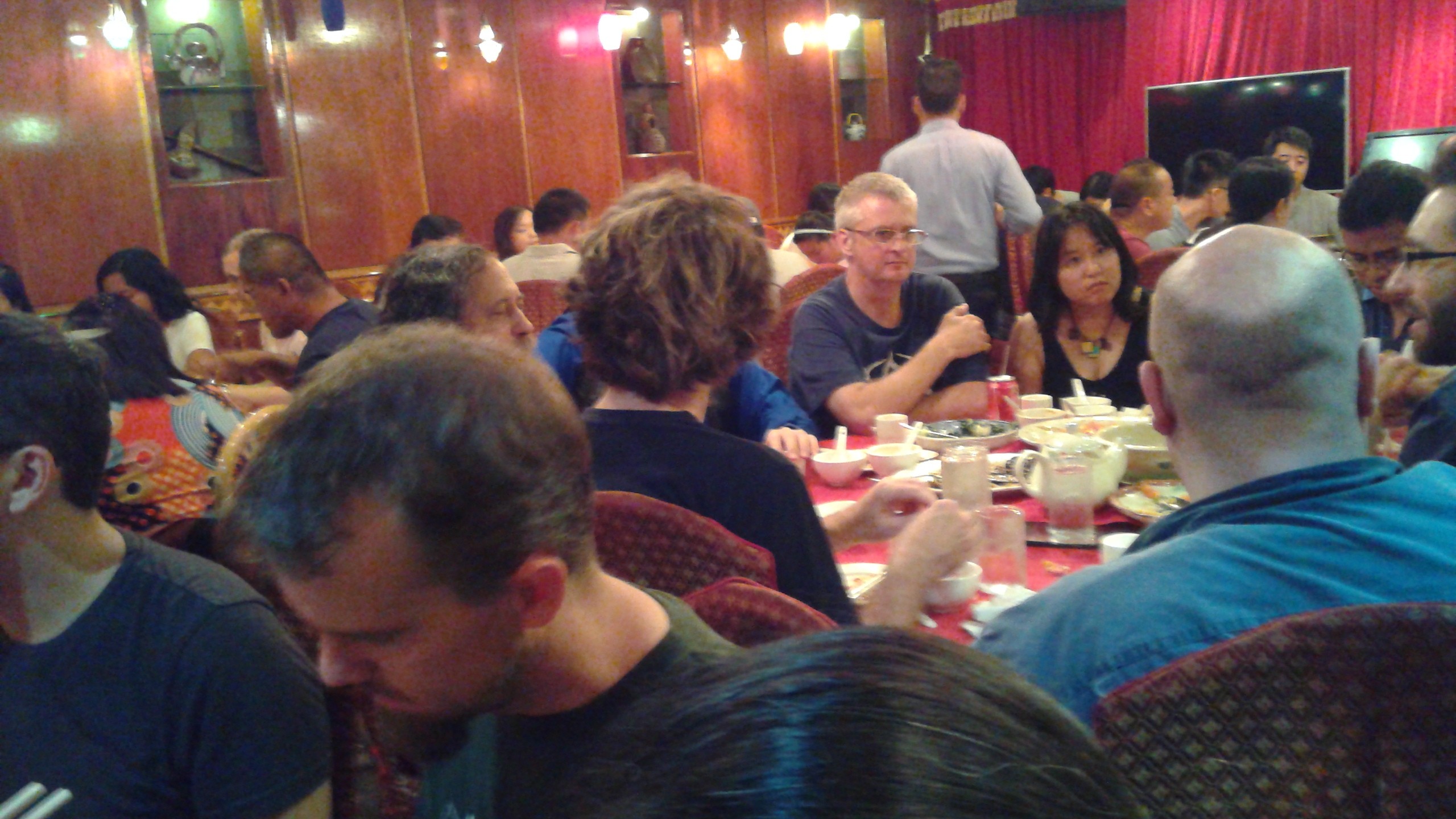
Eighteen people joined RMS for dinner and informal conversation in NYC at Congee Village. I love Drupal almost as much as I love food and freedom.
These group experiences had an affect on the community and I have since heard from several developers on how much they really enjoyed meeting RMS and knowing more about the ways free software affects our lives and our communities. One person commented "I thought RMS would be a jerk, like Linus, but he is really humble and kind when you talk to him in person."
A lot of people ask me if I work for the Free Software Foundation and my response is - no, I am a worker-owner with Agaric and we do web development using free software, but on the issues of freedom, I really work for you and me. Together, we are the mothers and fathers of our own freedoms, or not. The choice is ours to make.
What an excellent time! Your voice and thoughts are needed. Our society is only as free as the tenets on which it is built upon.
Let's free our future with free software as the
Drupal 8 migrations quickstart guide (half day training)
DrupalCon Nashville
Learning objectives:
- Understand the different approaches to upgrading your site to Drupal 8 using the Migrate API.
- Revise site architecture and map configuration from previous site to the new one (content types, fields, etc).
- Learn how to migrate data from modules that do not offer automated migrations.
- Learn how to migrate data into media entities and paragraphs.
This is an advanced course. You should be familiar with source, process, and destination plugins; how the process pipeline operates; and how to execute migrations from the command line via Drush. Understanding the migrations in this demo repo suffices to take this training. Note that the repo mentioned before is not the one we will be covering with the training. You can also have a look at this video for an overview of the Migrate API.
What does privacy and data trust mean to you, in your daily work and life? Does it mean that your door to your house is locked or that your email is encrypted, or both? Do you use cloud services or social media for business or for personal lifestyle news and updates? No matter how you use social media and engage in a conversation, you are tracked and sorted into buckets. What does that really mean?
Background
For more than a decade, Agaric has had a special expertise in content migrations. The first substantial treatment of Drupal content migration in a book came with Upgrading a Drupal Site from 6 to 7 by Benjamin Melançon and Stefan Freudenberg with a Data Migration overview by Mike Ryan in The Definitive Guide to Drupal 7, a 35-author tome of Drupal knowledge from experts led by Agaric co-founder Ben Melançon.
More recently, Agaric worker-owner Mauricio Dinarte wrote an epic 31 blog post tutorials about migrating into Drupal in one month and leads migration trainings at Drupal conferences (DrupalCon), camps, and online, including Drupal 8/9 content migrations and Upgrading to Drupal 8/9 using the Migrate API.
How can we help?
Please share where you want to go with your site and a way to contact you!
Pagination
- Previous page
- Page 10

